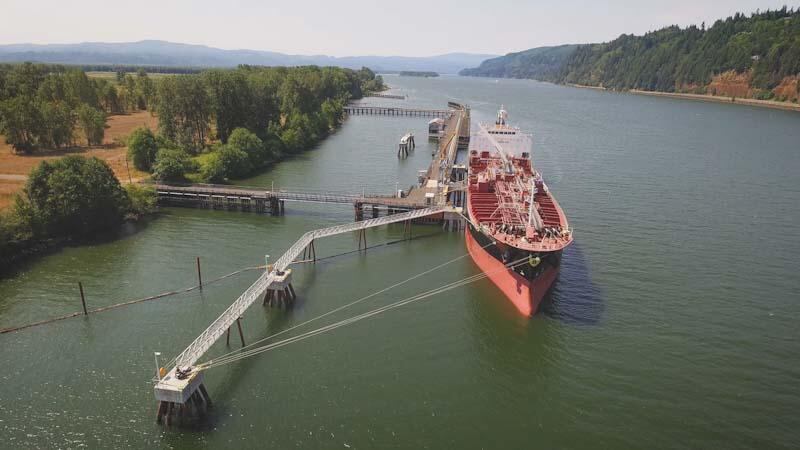The board of the Beaver Drainage Improvement Company dropped a legal challenge that threatened to delay or even deep-six plans by Next Renewable Fuels to build the largest renewable diesel refinery in the country on land along the Columbia River near Clatskanie.
At the same time, the board voted yesterday to reject a settlement agreement from Next that would have paid $3.5 million over 10 years to help the BDIC care for the aging levees in return for full-throated support for Next’s plans and a guarantee never to oppose them. By rejecting the settlement, the BDIC maintains its right to weigh in on the refinery project as it goes through the approval process.
“It was a tough decision, but we feel confident that it was the best decision for all parties,” BDIC director Truett Stolzenburg said during the public meeting in Clatskanie yesterday.
Previous BDIC meetings have been contentious, with landowners in the drainage district speaking out against Next, saying that the proposed $2.5 billion plant at Port Westward, which sits amid the drainage, will foul the air, pave over valuable farmland, and create an earthquake hazard on silty land that sits below river level behind aging levees. The Columbia Riverkeeper and 1000 Friends of Oregon also oppose the plant.
Like biodiesel, renewable diesel can be made from nonpetroleum sources such as used cooking oil. Next has said it plans to use waste from fish-processing plants in the Northwest and Asia. Oregon law encourages the use of renewable diesel because it releases far fewer greenhouse gases than petroleum when it’s burned, though it does require the addition of hydrogen, which, in Next’s case, will come from natural gas.
The plant needs myriad approvals, including one from the Oregon Department of State Lands that allows it to remove soil or fill in wetlands. Next got that permit in March, but the BDIC appealed it, saying Next’s plans needed further study. The drainage district dropped that appeal yesterday.
Both Next and the farmers in the drainage declared victory.
“We are thrilled to learn that the BDIC Board passed a resolution to immediately withdraw their appeal of our DSL Removal Fill permit,” said Michael Hinrichs, Next’s director of communications. “This is a win for NEXT, and we look forward to maintaining our positive and collaborative relationship with the BDIC Board of Directors.”
The farmers, meantime, focused on the rejection of the settlement.
“Yesterday’s BDIC Board decision was a massive and meaningful statement from our community about the unshakeable values that persist around Port Westward,“ said Jasmine Lillich, a farmer who owns land in Clatskanie near the drainage district. “Three and a half million dollars is not the price tag of our freedom and our farmland. We are going to fight for the agricultural heritage and character of the district.”
The BDIC is a corporation set up decades ago under Oregon law to manage the dikes that keep the Columbia River from flooding 5,717 acres of rich farmland known as the Beaver Drainage District. Landowners in the district have one vote on company matters for each acre they own. The BDIC has three board members who handle day-to-day issues. Only two board members—Stolzenburg and Tim Keranan—voted yesterday because Warren Seely, a local mint farmer, had recused himself because of a conflict of interest.
Mike Seely, Warren’s father, said the BDIC board shouldn’t have abandoned its land appeal.
“I was pleasantly surprised that they dropped the settlement offer,” Seely said, “but I was extremely disappointed that they are dropping the appeal. I’m looking at my options with attorneys.”
Seely is among the largest landowners in the Beaver Drainage, where he grows heirloom Black Mitcham peppermint that flavors Burgerville shakes and Salt & Straw ice cream. He also has his own line of mint patties.
Farmers in the district had vowed to fight the BDIC board if it approved the settlement with Next. They had argued that the settlement must go to a landowner vote because it would have changed the BDIC’s ability to care for the levees and the land.
“According to your bylaws, voting on this settlement would need a two-thirds acreage vote to ratify since this settlement adds new rules and regulations to the BDIC and would restrict the BDIC from performing maintenance,” landowner Wendy Schmidt wrote before the vote.
The two-thirds requirement meant that a vote on the settlement likely would have failed, according to Lillich, the farmer. She and others circulated a petition against the settlement agreement, winning signatures from people who own more than 2,000 of the 5,717 acres in the drainage, or about 35%. If that level of opposition had held in a vote, the agreement would have failed.
Next faces another hurdle Oct. 28, when the Oregon Land Use Board of Appeals is scheduled to rule on whether Next can install railroad tracks to serve the proposed plant. The decision turns on whether the tracks constitute a “yard” or a “branch line.” They’re being built on land zoned for agriculture, where a branch line would be permitted but a larger yard would not, according to Columbia Riverkeeper, which appealed Columbia County’s March 23 decision to allow the rail line.
Next says it needs the new railroad tracks to import vegetable oil and other raw materials—and export refined diesel—should the Columbia River close to tanker traffic. Opponents of the project say the 12.3-acre rail terminal is a “yard” that would block access to mint fields owned by local farmers.

